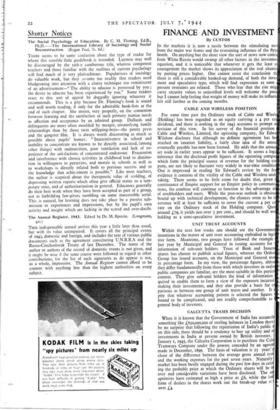Shorter Notices
The Social Psychology of Education. By C. M. Fleming, Ed.B., Ph.D.--The International Library of Sociology anti Social Reconstruction. (Kegan Paul, 7s. 6d.) THERE seems to be some confusion about the type of reader for whom this sensible little guidebook is intended. Laymen may well be discouraged by the rather cumberous title, whereas competent teachers and those familiar with the outlines of current psychology will find much of it very platitudinous. Popularisers of sociology do valuable work, but they assume too readily that readers need bludgeoning into attention with a chatty technique too reminiscent of an advertisement—" The ability to educate is possessed by you ; the desire to educate has been experienced by you." Some readers react to this sort of appeal by doggedly ignoring whatever it recommends. This is a pity because Dr. Fleming's book is sound and well worth reading, if only for the admirable book-lists at the end of each chapter. She insists, very properly, on the connexion between learning and the satisfaction of such primary human needs as affection and acceptance by an admired group. Dullards and delinquents are more often moulded by meagre, unsatisfying family relationships than by those twin whipping-boys—the penny press and the gangster film. It is always worth discovering as much as possible about pupils' homes : " Inattentiveness in school and inability to concentrate are known to be directly associated. (among other things) with malnutrition, poor ventilation and lack of ex- perience of the satisfactions of concentrated endeavour. Frustration and interference with chosen activities in childhood lead to diminu- tion in willingness to persevere, and morale in schools as well as in workshops is directly related both to previous success and to the knowledge that achievement is possible." Like most teachers, the author is sceptical about the therapeutic value of scolding, of depressing written reports which often give official status to a tem- porary state, and of authoritarianism in general. Educators generally do their best work when they have been accepted as part of a group, not as forbidding law-givers rumbling on some inaccessible serial. This is natural, for learning does not take place by a passive sub- mission to experiences and impressions, but by the pupil's own activity and insight which are lacking in the scared and over-docile.


























 Previous page
Previous page